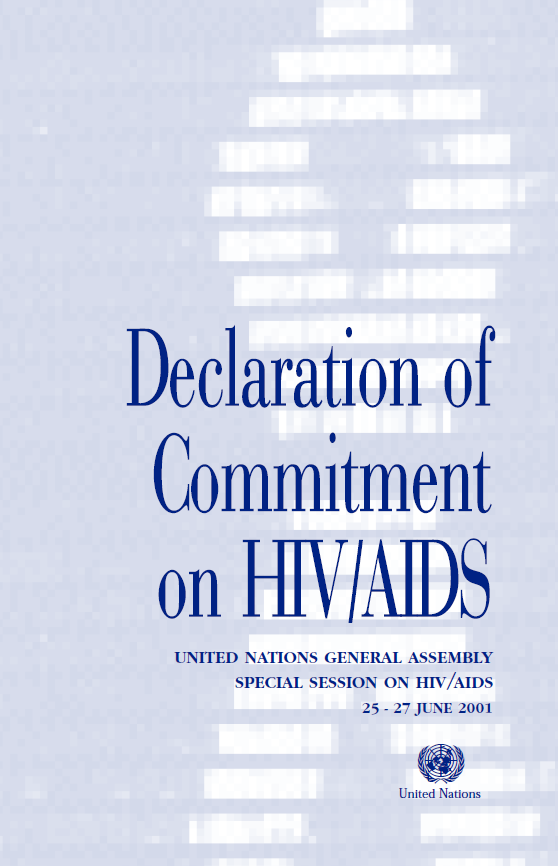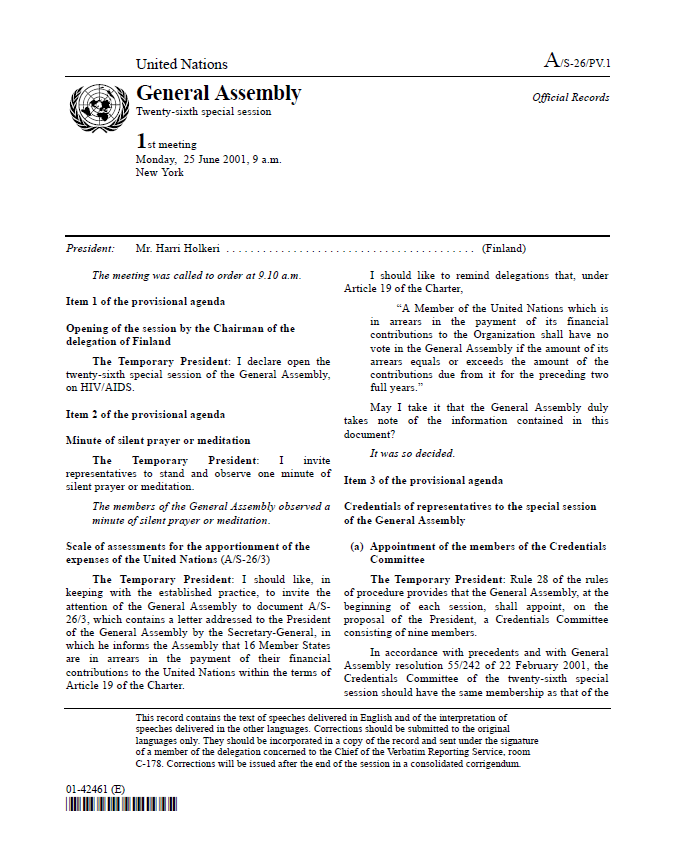2001 Declaration of Commitment on HIV/AIDS
Analysis of precedential value
This declaration is the product of the United Nations General Assembly Special Session on HIV/AIDS in June 2001. The UN General Assembly adopted this resolution without a general vote two months later. The General Assembly is the preeminent governing body of the UN system and consists of all 193 UN Member States.
Used as precedent
gender equality
“Stressing that gender equality and the empowerment of women are fundamental elements in the reduction of the vulnerability of women and girls to HIV/AIDS.” (paragraph 14)
“By 2005, implement measures to increase capacities of women and adolescent girls to protect themselves from the risk of HIV infection , principally through the provision of health care and health services, including for sexual and reproductive health, and through prevention education that promotes gender equality within a culturally and gender-sensitive framework.” (paragraph 60)
key population and community leadership
“Acknowledging the particular role and significant contribution of people living with HIV/AIDS, young people and civil society actors in addressing the problem of HIV/AIDS in all its aspects, and recognizing that their full involvement and participation in the design, planning, implementation and evaluation of programmes is crucial to the development of effective responses to the HIV/AIDS epidemic.” (paragraph 33)
“By 2005, develop and make significant progress in implementing comprehensive care strategies to: strengthen family and community-based care, including that provided by the informal sector, and healthcare systems to provide and monitor treatment to people living with HIV/AIDS, including infected children, and to support individuals, households,families and communities affected by HIV/AIDS; and improve the capacity and working conditions of health-care personnel, and the effectiveness of supply systems, financing plans and referral mechanisms required to provide access to affordable medicines, including antiretroviral drugs, diagnostics and related technologies, as well as quality medical, palliative and psychosocial care.” (paragraph 56)
comprehensive sexuality education
“By 2005, ensure that at least 90 per cent, and by 2010 at least 95 per cent of young men and women aged 15 to 24 have access to the information, education, including peer education and youth-specific HIV education, and services necessary to develop the life skills required to reduce their vulnerability to HIV infection, in full partnership with young persons,parents, families, educators and health-care providers” (paragraph 53)
human rights
“By 2003, enact, strengthen, or enforce, as appropriate, legislation, regulations and other measures to eliminate all forms of discrimination against and to ensure the full enjoyment of all human rights and fundamental freedoms by people living with HIV/AIDS and members of vulnerable groups, in particular to ensure their access to, inter alia, education, inheritance, employment, health care, social and health services, prevention, support, and treatment, information and legal protection, while respecting their privacy and confidentiality; and develop strategies to combat stigma and social exclusion connected with the epidemic.” (paragraph 58)
sexual rights
“By 2005, bearing in mind the context and character of the epidemic and that, globally, women and girls are disproportionately affected by HIV/AIDS, develop and accelerate the implementation of national strategies that promote the advancement of women and women’s full enjoyment of all human rights; promote shared responsibility of men and women to ensure safe sex; and empower women to have control over and decide freely and responsibly on matters related to their sexuality to increase their ability to protect themselves from HIV infection.” (paragraph 59)
bodily autonomy and integrity
“By 2005, ensure development and accelerated implementation of national strategies for women’s empowerment, the promotion and protection of women’s full enjoyment of all human rights and reduction of their vulnerabilities to HIV/AIDS through the elimination of all forms of discrimination, as well as all forms of violence against women and girls, including harmful traditional and customary practices, abuse, rape and other forms of sexual violence, battering and trafficking in women and girls.” (paragraph 61)
key and vulnerable populations
“By 2003, develop and/or strengthen national strategies, policies and programmes, supported by regional and international initiatives, as appropriate, through a participatory approach, to promote and protect the health of those identifiable groups which currently have high or increasing rates of HIV infection or which public health information indicates are at greatest risk of and most vulnerable to new infection as indicated by such factors as the local history of the epidemic, poverty, sexual practices, drug-using behaviour, livelihood, institutional location, disrupted social structures and population movements, forced or otherwise.” (paragraph 64)
“By 2003, develop and by 2005 implement national policies and strategies to build and strengthen governmental, family and community capacities to provide a supportive environment for orphans and girls and boys infected and affected by HIV/AIDS, including by providing appropriate counselling and psychosocial support, ensuring their enrolment in school and access to shelter, good nutrition and health and social services on an equal basis with other children; and protect orphans and vulnerable children from all forms of abuse, violence, exploitation, discrimination, trafficking and loss of inheritance.” (paragraph 65)
positive legal determinants
“By 2003, develop a national legal and policy framework that protects in the workplace the rights and dignity of persons living with and affected by HIV/AIDS and those at the greatest risk of HIV/AIDS, in consultation with representatives of employers and workers, taking account of established international guidelines on HIV/AIDS in the workplace.” (paragraph 69)

